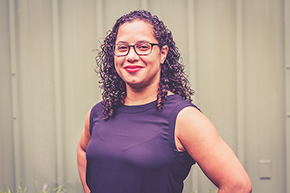Women’s History Month: Renee Bracey Sherman

Renee Bracey Sherman. Photo from the National Network of Abortion Funds
“Reproductive justice is our past, present, and our future. It is the framework that our ancestors thrived on. We cannot fight for reproductive and human rights without centering marginalized communities, the people who have abortions, those who parent in poverty, across borders and disabilities, and at a young age, and seek adoption in our work. They must be lifted up as the voices of our movement, leaders directing our movement, and the heart and souls shifting our movement. The deeper we invest in their leadership, the more liberating and radical our movement will be.”
If a contemporary reproductive justice advocate was what you needed, Renee Bracey Sherman is a name one should used to. As a woman who sought an abortion at the age of 19, she has served as a storyteller, social justice activist, writer, and public affairs influencer around abortion and the quest to de-stigmatize what is an intersectional and complicated issue. After receiving an undergraduate education in economics and sociology from Northeastern Illinois University and a Master’s degree in public administration from Cornell, she served as the Digital Editor for the Cornell Policy Review and Communications Chair for Women in Public Policy. In 2014, she wrote “Saying Abortion Aloud: Research and Recommendations for Public Abortion Storytellers and Organizations,” a guide to storytelling about abortion and reproductive health. Additionally, she authored a digital guide about online harassment and how to handle it, entitled “Speak up & Stay Safe(r).” She is a member of Echoing Ida, a writing collective made up of black women and a daughter project of Forward Together. She previously worked with the Sea Change Program, Reproductive Health Technologies Project, the Gender and Sexualities Alliance Network and Public Allies, an AmeriCorps program. She was also a board member of NARAL Pro-Choice America, the Young Nonprofit Professionals Network, and Peace First. Her literature, about abortion, access to it, health disparities in black women, and digital harassment, has been featured widely in renowned media outlets such as the BBC, EBONY magazine, TIME, the Washington Post, Cosmopolitan magazine, Glamour and The Atlantic.
Within one of our programs, the Reproductive Health Access Network, our members have been using storytelling as an advocacy-focused tool to affirm solidarity. These radical acts of reclaiming body, and voice will continue to pave the way of de-stigmatizing, and humanizing, abortion in the media, and popular culture. We thank Renee Bracey Sherman for all she does in this movement!
